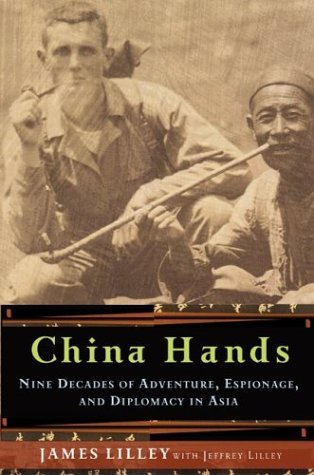

 |

|

The average rating for China hands based on 2 reviews is 4 stars.
Review # 1 was written on 2009-09-29 00:00:00 Matt Bonkowski Matt BonkowskiA fantastic memoir from a true "China hand," Lilley's vast experience in East Asia (born in Qingdao, China; later served as a CIA case officer in many Asian locales; went on to be U.S. Ambassador to China, South Korea, and Taiwan (ambassador equivalent)) makes for an engrossing and multifaceted book. It's interesting to see how Lilley leveraged personal connections (for instance, to George H. W. Bush) to garner some pretty choice assignments in the latter stages of a 4-decade career of government service, but his assignments were clearly a marriage of opportunity with "the right man for the job." Particularly interesting is the section near the end, while Lilley is the U.S. envoy to China, dealing with the unfolding June 4, 1989 Tiananmen Square Incident. A key player in Lilley's defense attache office was Larry Wortzel, whose name I recognized as currently a highly-regarded China expert in U.S. government circles, but in 1989 a hard-charging U.S. Army major working in Beijing and getting things done for Ambassador Lilley as chaos erupted all around them. At the same time I was reading Lilley's account of 6/4, I was listening to Zhao Ziyang's recollections of the events leading up to Tiananmen (his book is called "Prisoner of the State"; see my separate review of that book off my profile page). Comparing the two accounts is I think a useful way to see the unfolding events from two very different viewpoints, both of which are critical to understanding what happened and why). |
Review # 2 was written on 2013-11-30 00:00:00 Ron Mencel Ron MencelThrough this personal memoir, you get an insider's view on how intelligence and diplomatic communities work with and against each other and how they influence and are influenced by elected officials. It's a delicate dance of meetings, hierarchies, secrets and logistics. I like that Lilley first introduces himself to us through his childhood in China. Unlike other reviewers, I felt that the discussion of his brother was appropriate and just enough (not too much) for us to understand him and the significance his work had had for him. We follow Lilley through his covert operations to being, through wide experience (and I presume great competence), exactly the man for various important jobs when decisions are made to re-establish relations with China. Lilley, refreshingly, loves his work, and tells us what he is proud of and unabashedly, about his mistakes. I was surprised to see some aspects of the CIA work in print. While it is a moot point that Lilley flaunted British law in his CIA work in Hong Kong and Chinese law/protocol in China, I wondered about the propriety of these open admissions. Even more surprising to see in print was the founding of communist groups in the Middle East to create fellow travelers who could travel to China. I presume these things, since they appear publically here, along with the CIA'S 1960's work in Laos are now common knowledge. Lilley writes some of them in sketches, some in facts, some in passing. He gives no analysis or discussion of ramifications or controversies of these activities. His straightforward approach to these assignments was probably essential to doing this kind of work. Also of interest to those like me who often wonder how things "work", were the two "outings" he had, and how he overcame them to continue a useful career, a career he sees not as something for him, but something important for his country. Lilley is clearly loyal to family, friends and country. His career flourishes with Republicans and he is loyal to them too. The problems caused by balancing Taiwan and China, and conflicts within and across administrations are presented with criticism of the Carter administration, but the framing of similar problems posed by Reagan/Bush (who do not agree on the China-Taiwan balance) are framed as "challenging". He minimizes Fitzwater's exposure of the dissident Lilley was harboring in the embassy which results in over a year of domestic logistics and unneeded complications in relationships. (This dissident did not prove to share Lilley's quality of loyalty.) Lilley and his various teams were skillful in managing Chinese relations in turbulent times, and the world owes him for this. If you are interested in the Asia and the daily grind of the people who make it all happen, this book is for you. |
CAN'T FIND WHAT YOU'RE LOOKING FOR? CLICK HERE!!!